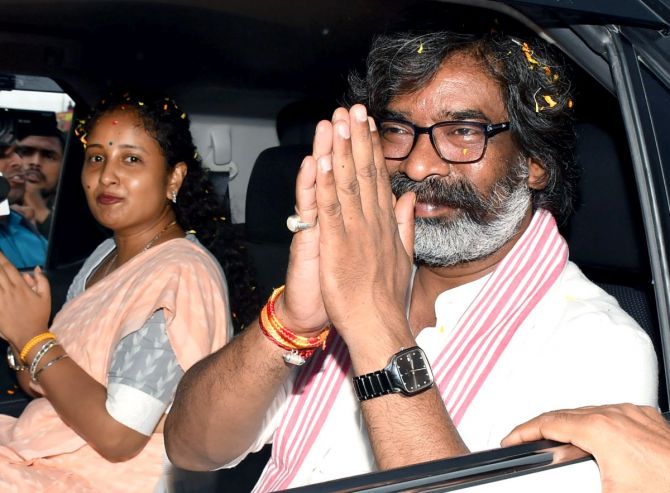Hemant Soren is back as Jharkhand’s Chief Minister, marking a significant political comeback after his release on bail. His return follows a tumultuous period, highlighting the resilience of the Jharkhand Mukti Morcha amidst legal challenges.
Hemant Soren is back as Jharkhand’s Chief Minister, marking a significant and dramatic chapter in the state’s political narrative. On Thursday evening, Hemant Soren, the executive president of the Jharkhand Mukti Morcha (JMM), took the oath of office for the third time, following an invitation from Governor CP Radhakrishnan to form the government. Hemant Soren is back, and this return is particularly noteworthy as it follows his recent release on bail in a high-profile land scam case, after spending approximately five months in jail.
Hemant Soren is back in the Chief Minister’s office, and his return has been a focal point of Jharkhand’s political scene. His leadership and political strategies are closely watched, given his influential position within the JMM and his familial ties, being the son of JMM supremo Shibu Soren. The younger Soren’s journey back to the top political post in the state underscores the resilience and the continued dominance of the JMM in Jharkhand’s politics.
The sequence of events leading to Hemant Soren is back narrative began with his resignation as Chief Minister shortly before his arrest on January 31 by the Enforcement Directorate (ED) in connection with a money laundering case linked to an alleged land scam. His resignation paved the way for Champai Soren to assume the role of the 12th Chief Minister on February 2. However, Hemant Soren’s release from jail on June 28, following a bail order from the Jharkhand High Court, set the stage for his political comeback.
The High Court’s bail order, delivered by Justice Rongon Mukhopadhyay, was based on the belief that the petitioner, Hemant Soren, was “not guilty.” However, this order is under scrutiny, with the ED expected to challenge it in the Supreme Court. The ED contends that Soren does not meet the twin conditions required under section 45 of the Prevention of Money Laundering Act (PMLA), which adds a layer of legal complexity to his political resurgence.
On Wednesday, a day before his swearing-in, the JMM-led alliance in Jharkhand unanimously elected Hemant Soren as the legislature party leader. This decision followed the resignation of Champai Soren, who had stepped down to make way for Hemant Soren’s return. This move highlighted the unity and strategic alignment within the JMM and its allies, as they rallied behind Soren to lead the government once again.
Hemant Soren is back to power and is set against the backdrop of a shifting political landscape in Jharkhand. The strength of the JMM-led alliance has been reduced to 45 MLAs, comprising 27 from JMM, 17 from Congress, and 1 from the Rashtriya Janata Dal (RJD). This reduction followed the Lok Sabha elections, during which two JMM MLAs, Nalin Soren and Joba Majhi, were elected to the Parliament. Additionally, Jama legislator Sita Soren resigned from the JMM to contest the general elections on a BJP ticket. Further complicating matters, the JMM expelled two more legislators, Bishunpur MLA Chamra Linda and Boriyo MLA Lobin Hembrom, due to internal party dynamics.
Similarly, the Opposition BJP has seen its strength reduced to 24 MLAs. Two of its members, Dhulu Mahto (Baghmara) and Manish Jaiswal (Hazaribag), were elected to the Lok Sabha, prompting a reconfiguration of the party’s legislative presence in the state. The BJP also faced internal challenges, expelling Mandu MLA Jaiprakash Bhai Patel after he joined the Congress to contest the elections.
Hemant Soren is back in the Chief Minister’s office, and this is not just a personal victory but also a significant moment for the JMM and its allies. His leadership is expected to navigate the alliance through the current political and legal challenges. The anticipation surrounding his return is heightened by the ED’s impending legal actions and the ongoing scrutiny of the High Court’s bail order.
In conclusion, Hemant Soren is back as Jharkhand’s Chief Minister for the third time, a testament to his enduring political influence and the strategic maneuvering of the JMM. Despite the legal hurdles and the dynamic political environment, Soren’s leadership continues to shape Jharkhand’s political future. His ability to consolidate support within the alliance and address the challenges ahead will be critical in determining the stability and direction of his government.
For further insights and comprehensive content, please visit our homepage



